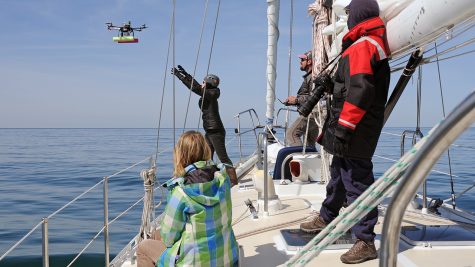
PHOTO COURTESY: Véronique LaCapra, Woods Hole Oceanographic Institution.
WOODS HOLE – Scientists at the Woods Hole Oceanographic Institution and the National Oceanic and Atmospheric Administration are studying the health of critically endangered whales—using drones.
This spring, a research team led by WHOI biologist Michael Moore and NOAA researchers sailed out into Cape Cod Bay in search of North Atlantic right whales feeding just off the coast.
They used a remotely controlled, six-rotor hexacopter to take detailed aerial photographs of the whales and collect samples of their “blow”—the moist breath that a whale sprays out of its blowhole when it exhales.
Over the course of three weeks, the researchers completed 67 drone flights, photographing about 35 different whales and gathering 16 blow samples.
The next step for the researchers will be to analyze the data they collected.
Understanding the health of North Atlantic right whales may prove critical to their survival: there are fewer than 500 of these animals left.
They spend most of their lives within 50 miles of the East Coast of North America, making them vulnerable to human activities.
Based on available data, more than half of right whiles die in collisions with ships or by becoming entangled in fishing gear.
In addition, climate change and a warming ocean may be reducing their main source of food—tiny crustaceans called copepods—leaving some right whales undernourished and less able to reproduce.
Material from Véronique LaCapra, Woods Hole Oceanographic Institution.

























Speak Your Mind